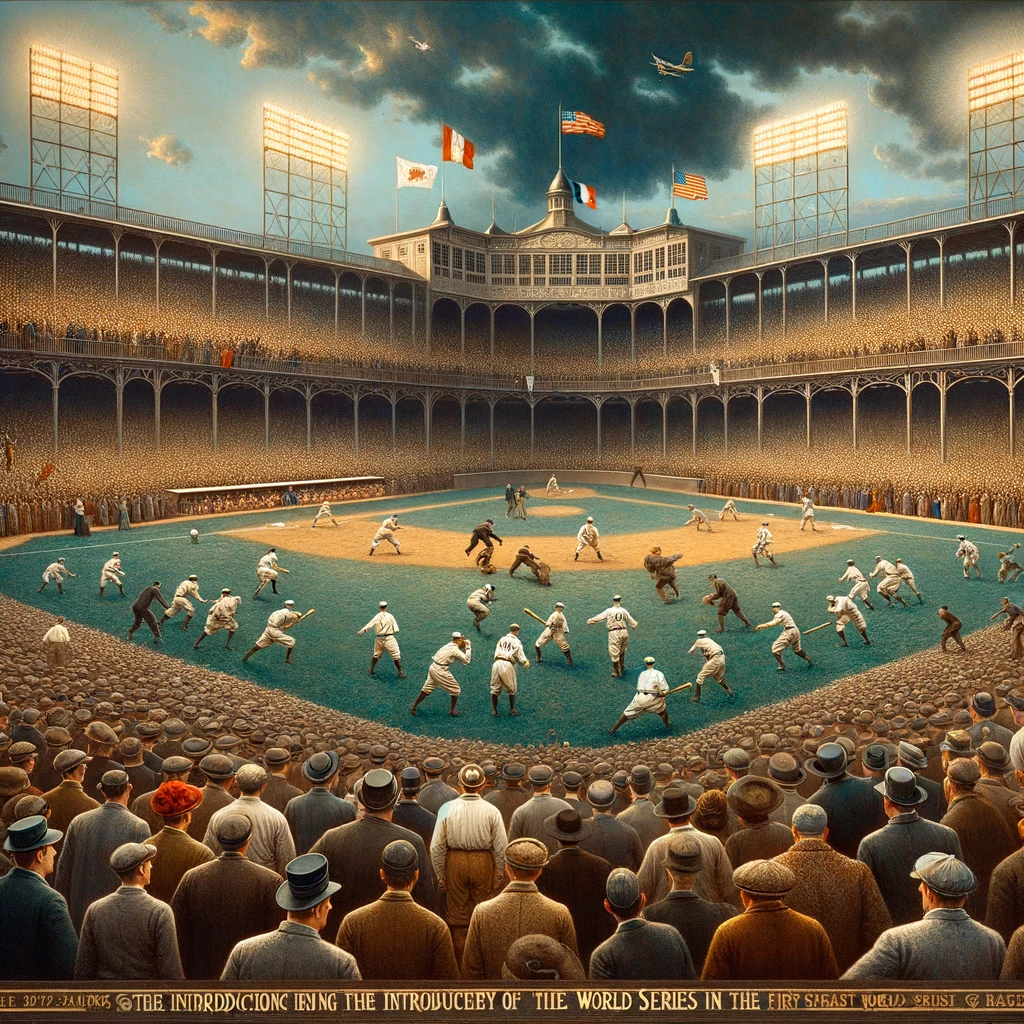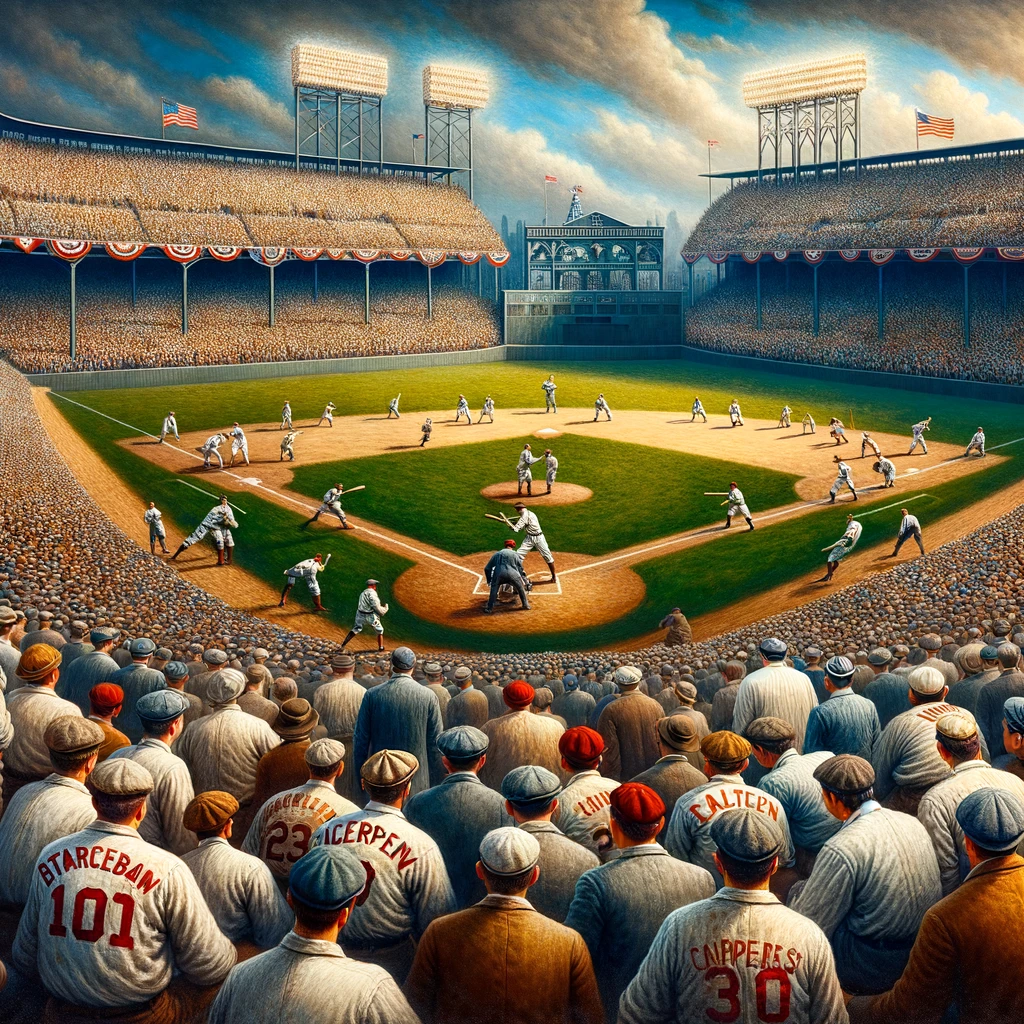The Dawn of a New Era in Baseball
In 1903, the landscape of American sports underwent a seismic shift with the introduction of the World Series, a championship that would come to define the essence of baseball in the United States and beyond. This article delves into the early history of baseball, leading up to the creation of the World Series, a momentous event that marked the beginning of a new era in sports history.
The Roots of Baseball
The origins of baseball, often referred to as America’s pastime, are shrouded in myth and folklore. While the exact beginnings of the game are debated, it is widely accepted that baseball evolved from older bat-and-ball games such as cricket and rounders. By the mid-19th century, various versions of baseball were being played across the United States, with the New York Knickerbocker Baseball Club setting down the first known rules in 1845.
The National Pastime Grows
As the game’s popularity grew, so did the need for a more structured approach. This led to the formation of the National Association of Base Ball Players (NABBP) in 1857, the first organization to govern the sport and sanction championship games. The Civil War played an unexpected role in baseball’s spread, as soldiers from different regions played the game during lulls in the conflict, taking their love for the sport back home after the war.
Professionalism in Baseball
The concept of paid players was initially controversial, but it became increasingly common in the late 1860s. The Cincinnati Red Stockings, formed in 1869, are recognized as the first fully professional baseball team. Their success and popularity led to the establishment of the National Association of Professional Base Ball Players in 1871, the first professional baseball league.
The Rise of Major Leagues
The National League (NL) was founded in 1876, under the leadership of William Hulbert. It was more structured and disciplined than its predecessors, imposing strict rules on player contracts, schedules, and team movements. The NL’s dominance was challenged in 1901 with the creation of the American League (AL) by Ban Johnson, who sought to establish a league that could compete with the NL in terms of talent and popularity.
Birth of the World Series
The rivalry between the NL and AL was fierce and often contentious, leading to bidding wars over players and disagreements over baseball’s governance. However, the desire for a true national championship was strong among players, fans, and team owners alike. This led to the historic agreement in 1903 to hold a championship series between the two leagues’ champions. The Boston Americans (later known as the Red Sox) of the AL and the Pittsburgh Pirates of the NL were the first teams to compete in this new championship, known as the World Series.
The 1903 World Series
The 1903 World Series was a best-of-nine series, a format that was unique to the early years of the championship. The games were held at the Huntington Avenue Grounds in Boston and Exposition Park in Pittsburgh. The series showcased a stark contrast in styles and strategies between the two leagues, which added to the excitement and intrigue of the games.
Cy Young, one of the most legendary pitchers in baseball history, played a crucial role for the Boston Americans. Meanwhile, the Pittsburgh Pirates were led by their star player, Honus Wagner, one of the era’s most prolific hitters. The series was fiercely contested, with both teams displaying skill, strategy, and a deep desire to claim the title of world champions.
The Boston Americans ultimately triumphed, winning the series 5-3. This victory was not just a win for the team but a symbolic moment for the AL, establishing it as a league on par with the NL. The success of the 1903 World Series set a precedent, and it became an annual event, barring a few exceptions.
Legacy and Impact
The World Series rapidly grew in popularity, becoming a staple of American culture. It helped bridge the divide between the NL and AL, leading to the eventual merger of the two leagues under the umbrella of Major League Baseball. The World Series also had a significant impact on the sport itself, promoting a higher level of play, encouraging innovation in strategies and tactics, and fostering a spirit of healthy competition.
The introduction of the World Series in 1903 was more than just the birth of a championship; it was the culmination of decades of evolution in the sport of baseball. It symbolized the maturity of baseball as a professional sport and laid the foundation for what would become one of the most beloved and enduring traditions in American sports history.

The Evolution of the World Series
The World Series, since its inception, has undergone numerous changes reflecting the evolution of the sport. From the early days of best-of-nine formats to the current best-of-seven, the World Series has adapted to the changing dynamics of baseball. The integration of African American players in the late 1940s, exemplified by Jackie Robinson’s debut, brought new energy and talent to the game, further elevating the status of the World Series.
Iconic Moments and Legendary Figures
The World Series has been a stage for some of the most iconic moments in sports history. Babe Ruth’s called shot in 1932, Bill Mazeroski’s walk-off home run in 1960, and the “Miracle Mets” of 1969 are just a few examples. These moments transcended the sport, embedding themselves into the fabric of American culture and folklore.
Legendary figures have emerged from the World Series, etching their names into the annals of baseball lore. Players like Lou Gehrig, Joe DiMaggio, Mickey Mantle, and Bob Gibson not only showcased their extraordinary skills but also embodied the spirit and resilience of their respective eras. Their performances in the World Series have become benchmarks of excellence in baseball.
Impact on Baseball and Society
The World Series has had a profound impact on the sport of baseball and American society. It has been a reflection of societal changes, including racial integration, wartime impacts, and the struggle for gender equality. The series has also been a unifying force, bringing people together across different backgrounds to celebrate a shared passion for the game.
The economic impact of the World Series cannot be overstated. It has significantly contributed to the growth of the sports industry, from broadcasting rights and sponsorships to merchandise sales and tourism. Cities hosting World Series games often experience a surge in economic activity, highlighting the event’s broad-reaching influence.
Challenges and Triumphs
The World Series has faced its share of challenges, including the infamous Black Sox Scandal of 1919, where players were accused of fixing the series. Such events tested the integrity of the game but also led to significant reforms and the appointment of the first Commissioner of Baseball.
The triumphs, however, far outweigh the challenges. Moments like the New York Yankees’ dominance in the late 1990s and the Boston Red Sox breaking the “Curse of the Bambino” in 2004 are testaments to the resilience and unpredictability that make the World Series captivating.
The Modern World Series
In the modern era, the World Series continues to be a showcase of global talent, with players from around the world contributing to the rich tapestry of the game. Innovations in technology and analytics have transformed how the game is played and viewed, but the essence of the World Series remains the same – a celebration of excellence in baseball.
Conclusion
The World Series, since its humble beginnings in 1903, has grown into a global phenomenon, transcending the sport of baseball. It is a testament to the enduring appeal of the game and its ability to adapt and thrive through changing times. The World Series is not just a championship; it’s a yearly pilgrimage for baseball fans, a time-honored tradition that continues to captivate and inspire.
As we look back on over a century of World Series history, we are reminded of the unifying power of sports and the timeless appeal of baseball. The story of the World Series is a reflection of the human spirit – its triumphs, its challenges, and its relentless pursuit of excellence.
